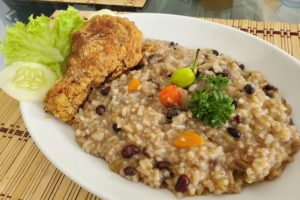“Wha yuh seh?”
“Ah deh ya… tryin’ fuh hold on.”
If you understand that, you’re holding on to more than just a conversation—you’re holding on to culture, identity, and the voice of a people. Creolese (or Guyanese Creole) isn’t just “broken English.” It’s a living, breathing language that tells the story of who we are. From the coastlands to the hinterlands, from Granny’s kitchen to WhatsApp chats—it’s how we talk, how we laugh, how we live. But in a world of formal speech, foreign influence, and growing migration, the question becomes: How do we keep Creolese alive?
Let’s dig into the why, how, and heart of Guyana’s real mother tongue.
Creolese is History You Can Hear
Creolese was born out of necessity and survival. When enslaved Africans, indentured laborers, and colonizers came to this land from different corners of the earth, a common language had to form. What emerged was Creolese—a fusion of African languages, English, Dutch, Hindi, Portuguese, and Amerindian words. It wasn’t taught in classrooms, but on rice fields, in market stalls, and over verandah railings. It was coded, clever, and full of rhythm. It evolved from pain but carried humor, wisdom, and resilience. Creolese is oral history at its finest—passed from one generation to the next, like a mango seed you don’t throw away.
It’s the Language of the Everyday
- Go to any market in Guyana and listen. Really listen.
- You’ll hear a language that’s efficient, expressive, and emotive:
- “Leh me tell yuh somtin…” (Pay attention, this important.)
- “Ow man, da mek sense?” (Seriously?)
- “Yuh belly full?” (Are you satisfied—not just with food, but with life.)
Creolese doesn’t just communicate—it connects. It’s not what you say, but how you say it, and who you say it to. That’s why no matter how far you travel—a voice in Creolese can feel like home.
From Shame to Pride: The Shift in Mindset
For years, many were told not to speak “bad English.”
Some were corrected in school, or discouraged from using Creolese in public spaces. The result? Generations grew up thinking their natural way of speaking wasn’t “good enough.”
But now the tide is turning.
Linguists, writers, and educators are working hard to document, validate, and celebrate Creolese as a true language—not a lazy version of English, but a system with its own grammar, syntax, and soul. Schools and scholars are beginning to recognize its role in education and identity. Even artists, poets, and content creators are embracing it more openly—on stage, on social media, and in books.
Efforts to Preserve and Promote Creolese
Guyana is slowly waking up to the importance of archiving its heart language. Initiatives are emerging to:
- Record oral histories from elders
- Publish bilingual works (Creolese and English)
- Develop dictionaries and teaching tools
- Promote Creolese poetry, plays, and performances
Organizations and diaspora communities are also pushing to keep the language alive for future generations, especially as children born abroad may not hear it daily. Even small steps matter—like subtitling videos, teaching kids a proverb, or encouraging storytelling in Creolese at cultural events.
A Global Guyanese Voice
Here’s the beauty: Creolese is becoming a bridge between home and abroad.
For Guyanese in the diaspora, speaking or hearing Creolese is like tasting pepperpot after a long time—it awakens something deep inside. It’s also part of how we’re recognized worldwide. Just like Jamaicans have Patois and Trinis have their twang, Creolese is our sonic fingerprint. Our spice. Our stamp.
Why It Matters
Language is more than just words. It’s belonging. It’s identity. It’s memory. When we lose a language, we lose a lens through which a people saw the world. We lose jokes that don’t translate, wisdom that doesn’t sound the same, and stories that fall flat in foreign tongues.
Keeping Creolese alive means honoring our ancestors, empowering our children, and celebrating what makes us uniquely Guyanese.
So… Wah Yuh Guh Do?
Start simple.
Speak Creolese with pride.
Write a short story in it.
Share a proverb with your child.
Record your grandparents’ voices.
Laugh at a Creolese joke, and then tell it again.
Because every time we speak it, we save it.
What’s your favourite Creolese phrase or proverb? Drop it in the comments and let’s build a library of our language.
Creolese isn’t dying. It’s waiting—for us to listen, learn, and love it again.
Discover more from Things Guyana
Subscribe to get the latest posts sent to your email.







